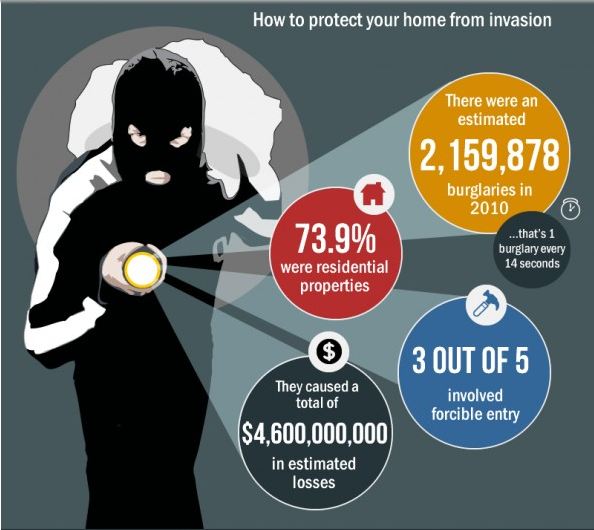
10 Ways to Avoid Home Invasion
For about the last decade or so now in North America, home invasions have been increasing at alarming rates. While the police regard these as burglaries, they generally are much more violent than a regular break and enter home burglary.
Since there are no specific charges in the Criminal Code as "home invasion", the actual statistics, and prevalence of home invasions are hard to quantify. A problem here is too, that without a clear picture of how real the risk of these crimes happening in your area are, it is hard to inform the public against them.
How To Protect Your Home From Invasion
The home invader works in many ways, quite opposite to the common home burglar. Where the burglar commonly will pick homes he knows are likely to not be occupied, the home invader is looking for a home with the residents at home.
In most cases, this is because the criminal feels that backed by the threats of immediate violence, they could gain information from the residents, like where valuables are stored, banking information, "PIN numbers", etc.
The common burglar invariably works in the daytime, when people are at work -- between 9am and 5 pm, while most home invasions occur between 6pm and 6am. Most home invaders are armed, and carry restraining utilities, such as ropes and duct tape.
Home invaders will typically try to use a ploy to get the unsuspecting resident to open the door, upon which they will force their way in. It is usual that the ploy can involve a young girl to ring the doorbell, while her accomplices wait at the side of the door -- just out of reach of the peephole.

How to Combat Home Invasion Robbery
Use the peephole before opening your door at all times. If there is no-one visible, do not open it. Consider going one step further and get a CCTV monitoring system to monitor the front of your house. But rule number one remains: if you do not recognize the person(s) at the door, do not answer it.
The first defense between you and the thugs is a strong, solid core door. Preferably a steel one, set in a steel reinforced frame. The page on 24 home security tips has lots of information on making doors more secure. If you live in a rented flat, try to reinforce the door jambs and hinges with 2-3" screws.
Most likely, the screws that are there already will be to short to withstand the slightest pressure. You can reinforce the top and bottom of the frames with some thin metal braces in a way that could not be detected. Also, invest in a good mortise deadbolt, set in the door with 2" screws.
The next asset you have is your mobile telephone. Call 911 immediately when you suspect imminent home invasion.
Build a reinforced safe room in your house with an extra mobile phone, where you and your family can run to immediately when someone starts to kick your door down.
Fortify all exterior entrances to your home, especially rear patio doors and inner doors from the garage. Use metal braces to strengthen door frames and extra long screws. Or invest in a "high quality lock".

Get a CCTV camera system. If something does happen, there will be evidence for the police. Often, this sort of thing alone has helped solve the most horrific crimes. Even having a camera that monitors the inside of your premises would be a good idea.
Set up a speed-dial on your phone to 911, and also make it so that your phone can be used in speaker phone mode, so that when the 911 call comes in, the dispatcher can hear what is going on.
Practice an escape plan with your family, and have a way out of the house. Perhaps figure a way to get the children out of the house to go for help. If this is an issue in your area, talk to your neighbors about keeping a close eye on each others residences.
Do not ever agree to be taken to an ATM machine or anywhere else by an attacker - your life hangs in the balance. Same goes for getting into a vehicle.
Get a good home alarm monitoring system and have prominently displayed home alarm system decals on your doors and windows. This might be enough to deter those looking for a random mark.
